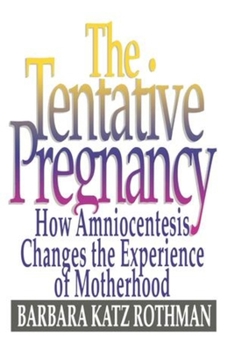The Tentative Pregnancy: How Amniocentesis Changes the Experience of Motherhood
Select Format
Select Condition 
Book Overview
As more and more women are having children when they are over thirty, amniocentesis, is becoming a routine part of prenatal care. In this groundbreaking book, Barbara Katz Rothman shows how this simple procedure can alter the way we think about childbirth and parenthood, forcing us to confront agonizing dilemmas: What do you do if there is a problem with the fetus? What kind of support is available if you decide to bring up a handicapped child? How...
Format:Paperback
Language:English
ISBN:0393309983
ISBN13:9780393309980
Release Date:June 1993
Publisher:W. W. Norton & Company
Length:304 Pages
Weight:0.70 lbs.
Dimensions:0.7" x 5.5" x 8.5"
Customer Reviews
3 ratings
A unique look at prenatal testing and women's choices
Published by Thriftbooks.com User , 16 years ago
The Tentative Pregnancy is totally relevant to the relatively new and increasingly common experience of technological pregnancy and birth. I don't believe it was Barbara Katz Rothman's intention to judge women for our responses to the complex choices that technology presents us with, but rather to give us a wider context with which to judge and make those choices ourselves. This book is partially about a paradigm women have long been familiar with: when rights become responsibilities. There's a restructuring of values each time a new option is placed on the table. Ostensibly the new right means increased freedom, but eventually we see that it limits us in a new way, as old options are taken off the table or are made so unpopular that we confront a crossroads. The Tentative Pregnancy left me feeling nostalgic for the good old days before technology had wrung most of the mystery out of motherhood. The author isn't out to convince women to abstain from testing altogether. She presents a well-researched and thoughtful look at the potential consequences--emotional and physical--of individual tests and leaves it to women to decide how much and under what circumstances they want to let technology shape their experience of motherhood. No one can tell a woman whether or not she should test, but Rothman acts as a knowledgeable and compassionate guide through the decision making process. Prenatal testing has become so routinely prescribed as to be taken for granted by the medical community. Women need support and information in order to exercise their rights and this book is an invaluable resource. The advantage of being able to test for genetic anomalies has become, in many cases, a requirement to test for abnormalities. As insurance companies compel women to jump through hoops in order to maintain coverage and doctors seek to minimize liability, testing is less and less presented as a choice we have the right to make. Society also lays claim to our choices, since imperfect or differently-abled children are perceived as a common burden. It's important to understand the limits of testing. We have a false perception that testing can assure us that our babies are healthy. It can't. The best it can do is to tell us they're not. But many women are not adequately warned about the unintended emotional consequences of false positives, which are common. One of the biggest tragedies of prenatal testing is when the results introduce terminal doubt into a healthy pregnancy. Even if a test for Downs Syndrome or other genetic marker turns out later to be a false positive, the anxiety the mother experienced (and might continue to experience through birth and even beyond, as Rothman's research disturbingly shows) has repercussions for her developing baby. Sometimes women choose to abort a healthy baby after a negative test result follows a positive one because they can't shake the suspicion that something is wrong. The message of The Tentative Pregna
Food for thought
Published by Thriftbooks.com User , 21 years ago
This book is the result of a study. It is about the expierence women had after getting back a flagged test or after getting a routine amniocentesis based on age or history. It is not a book about whether or not you should have an amnio it is about what your choices are and how women dealt with their results.This books will make you think about the abuse that routine prenatal tests can cause a woman and hopefully it will help you deciede whether or not you want the test done.I think this is a well writen book.
Amniocentesis . . . The Road To Abortion
Published by Thriftbooks.com User , 24 years ago
While not exactly what I expected I found this book to be rather eye opening. The premise of the author, while she wrote about 100 or so women she interviewed, was that amniocentesis is a test that, if the results are bad, leads to abortion. In other words, this test gives women the opportunity to selectively abort children who are seen as otherwise imperfect in today's society. Whether or not you support the test, this book gives you much food for thought. A word of caution though, this may not be the right book to read if you are looking for the right answers to an amniocentis you are contemplating right now. It may be better read while you are not pregnant.






